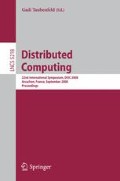Abstract
Adding Byzantin tolerance to large scale distributed systems is considered non-practical. The time, message and space requirements are very high. Recently, researches have investigated the broadcast problem in the presence of a f l -local Byzantin adversary. The local adversary cannot control more than f l neighbors of any given node. This paper proves sufficient conditions as to when the synchronous Byzantin consensus problem can be solved in the presence of a f l -local adversary.
Moreover, we show that for a family of graphs, the Byzantin consensus problem can be solved using a relatively small number of messages, and with time complexity proportional to the diameter of the network. Specifically, for a family of bounded-degree graphs with logarithmic diameter, O(logn) time and O(n logn) messages. Furthermore, our proposed solution requires constant memory space at each node.
Access this chapter
Tax calculation will be finalised at checkout
Purchases are for personal use only
Preview
Unable to display preview. Download preview PDF.
References
Afek, Y., Stupp, G.: Optimal time-space tradeoff for shared memory leader election. J. Algorithms 25(1), 95–117 (1997)
Attiya, H., Welch, J.: Distributed Computing: Fundamentals, Simulations and Advanced Topics. John Wiley & Sons, Chichester (2004)
Beauquier, J., Gradinariu, M., Johnen, C.: Memory space requirements for self-stabilizing leader election protocols. In: PODC 1999: Proceedings of the eighteenth annual ACM symposium on Principles of distributed computing, pp. 199–207. ACM, New York (1999)
Beauquier, J., Gradinariu, M., Johnen, C.: Randomized self-stabilizing and space optimal leader election under arbitrary scheduler on rings. Distributed Computing 20(1), 75–93 (2007)
Castro, M., Liskov, B.: Practical byzantine fault tolerance and proactive recovery. ACM Trans. Comput. Syst. 20(4), 398–461 (2002)
Dolev, D.: The byzantine generals strike again. Journal of Algorithms 3, 14–30 (1982)
Dolev, D., Reischuk, R.: Bounds on information exchange for byzantine agreement. J. ACM 32(1), 191–204 (1985)
Dolev, S.: Self-Stabilization. MIT Press, Cambridge (2000)
Dolev, S., Gouda, M.G., Schneider, M.: Memory requirements for silent stabilization. In: PODC 1996: Proceedings of the fifteenth annual ACM symposium on Principles of distributed computing, pp. 27–34. ACM, New York (1996)
Koo, C.-Y.: Broadcast in radio networks tolerating byzantine adversarial behavior. In: PODC 2004: Proceedings of the twenty-third annual ACM symposium on Principles of distributed computing, pp. 275–282. ACM, New York (2004)
Lamport, L., Shostak, R., Pease, M.: The byzantine generals problem. ACM Transactions on Programming Languages and Systems 4(3), 301–382 (1982)
Lynch, N.: Distributed Algorithms. Morgan Kaufmann, San Francisco (1996)
Pelc, A., Peleg, D.: Broadcasting with locally bounded byzantine faults. Inf. Process. Lett. 93(3), 109–115 (2005)
Toueg, S., Perry, K.J., Srikanth, T.K.: Fast distributed agreement. SIAM Journal on Computing 16(3), 445–457 (1987)
Yamashita, M., Kameda, T.: Computing on anonymous networks. i. characterizing the solvable cases. Parallel and Distributed Systems, IEEE Transactions 7(1), 69–89 (1996)
Author information
Authors and Affiliations
Editor information
Rights and permissions
Copyright information
© 2008 Springer-Verlag Berlin Heidelberg
About this paper
Cite this paper
Dolev, D., Hoch, E.N. (2008). Constant-Space Localized Byzantine Consensus. In: Taubenfeld, G. (eds) Distributed Computing. DISC 2008. Lecture Notes in Computer Science, vol 5218. Springer, Berlin, Heidelberg. https://doi.org/10.1007/978-3-540-87779-0_12
Download citation
DOI: https://doi.org/10.1007/978-3-540-87779-0_12
Publisher Name: Springer, Berlin, Heidelberg
Print ISBN: 978-3-540-87778-3
Online ISBN: 978-3-540-87779-0
eBook Packages: Computer ScienceComputer Science (R0)

